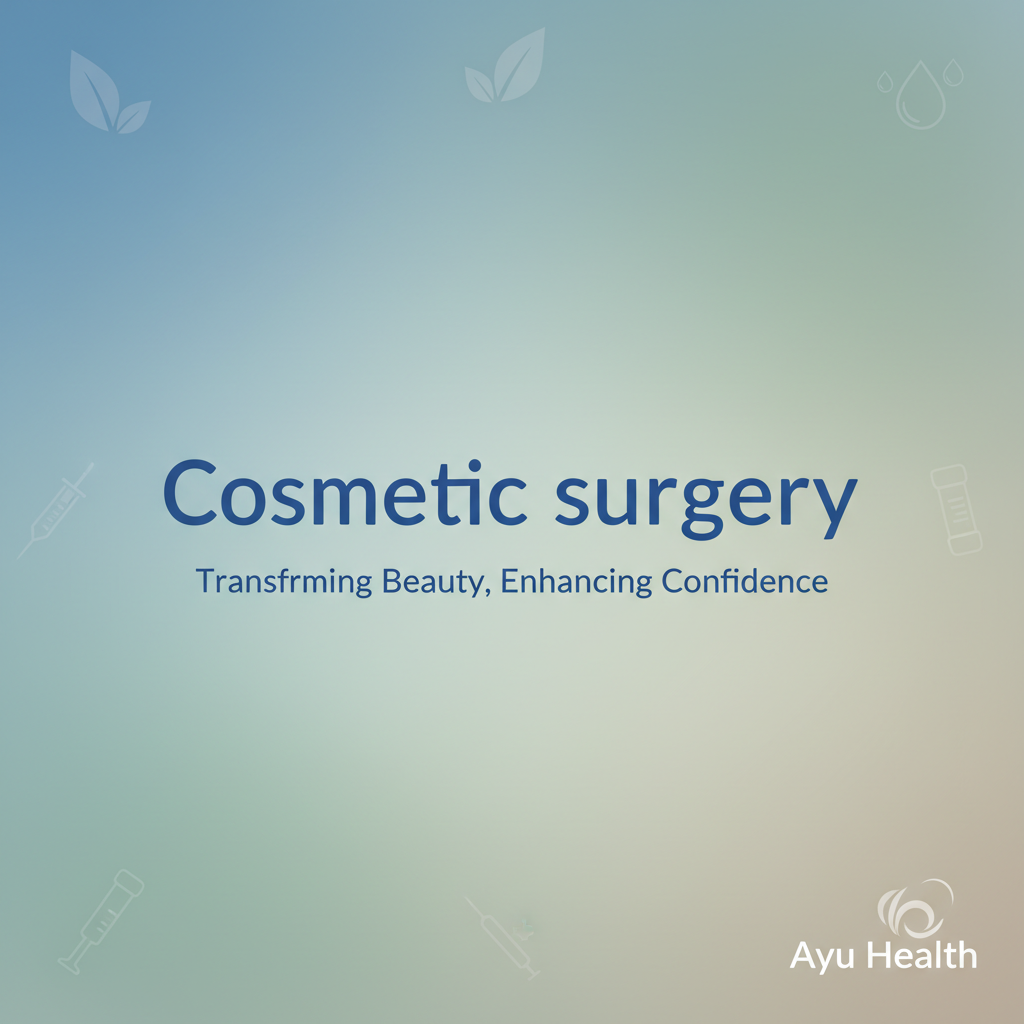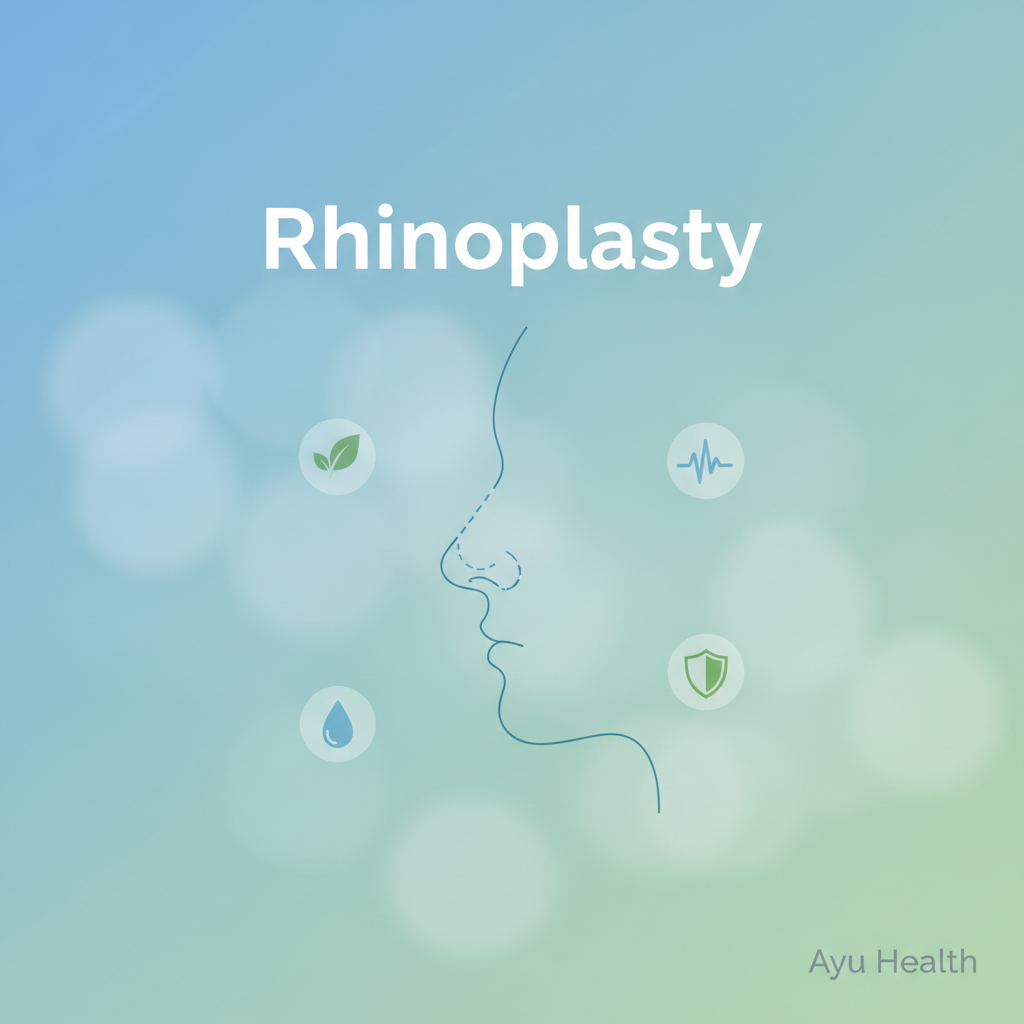What is Cosmetic Surgery?
Cosmetic surgery is a specialized branch of medicine focused on enhancing a person's appearance through surgical and medical techniques. Unlike reconstructive surgery, which aims to restore function and form after injury or disease, cosmetic surgery is primarily concerned with improving aesthetic qualities. This can involve altering facial features, reshaping the body, or addressing signs of aging.
The field encompasses a wide range of procedures, from minimally invasive treatments like Botox injections to more complex surgical interventions like facelifts and breast augmentation. The ultimate goal is to help individuals achieve a more pleasing and confident appearance, which can positively impact their self-esteem and overall well-being. In India, cosmetic surgery is becoming increasingly popular, with advancements in techniques and a growing awareness of its potential benefits.
Key Facts:
- Cosmetic surgery focuses on enhancing appearance.
- It includes both surgical and non-surgical procedures.
- Popularity is increasing in India.
- The aim is to improve self-esteem and confidence.
- It's distinct from reconstructive surgery.
Why is Cosmetic Surgery Performed?
Cosmetic surgery is performed for a variety of reasons, all centered around improving a person's self-perceived image. Common motivations include:
- Correcting Disproportional Features: Addressing perceived imbalances in facial or body features.
- Reversing Signs of Aging: Reducing wrinkles, sagging skin, and other age-related changes.
- Enhancing Specific Features: Augmenting or reshaping features like breasts, nose, or lips.
- Removing Excess Fat: Eliminating stubborn fat deposits through liposuction.
- Correcting Congenital Defects: Addressing birth defects that affect appearance.
- Improving Self-Confidence: Boosting self-esteem and overall well-being.
- Correcting asymmetry: Correcting asymmetry of face and other body parts.
- Improving proportions: Improving proportions of various body parts.
- Correcting scars: Surgical removal of scar tissue
When Doctors Recommend It:
Doctors might recommend cosmetic surgery when:
- A patient expresses persistent dissatisfaction with a specific feature.
- The patient has realistic expectations about the potential outcomes.
- The patient is in good overall health, minimizing surgical risks.
- The patient understands the recovery process and potential complications.
- The patient's concerns are causing significant emotional distress.
- When the patient has disproportional features or distortions caused by congenital defects, trauma, or accidents.
Preparation for Cosmetic Surgery
Proper preparation is crucial for ensuring a safe and successful cosmetic surgery experience. Here are the essential steps:
Essential Preparation Steps:
- Consultation: Schedule a detailed consultation with a qualified and experienced cosmetic surgeon. Discuss your goals, expectations, and medical history. Bring all relevant medical records.
- Medical Evaluation: Undergo a thorough medical evaluation, including blood tests, ECG, and other necessary investigations, to assess your overall health.
- Medication Review: Inform your surgeon about all medications, supplements, and herbal remedies you are taking. Some may need to be stopped before surgery.
- Lifestyle Adjustments: Quit smoking and avoid alcohol for several weeks before and after surgery, as they can impair healing.
- Diet: Maintain a healthy diet rich in vitamins and minerals to support your body's healing process.
- Pre-operative Instructions: Carefully follow your surgeon's pre-operative instructions regarding fasting, medication, and hygiene.
- Arrange for Support: Arrange for someone to drive you home after surgery and provide assistance during the initial recovery period.
- Prepare Your Home: Create a comfortable and clean environment at home to facilitate your recovery. Stock up on necessary supplies, such as pain medication, bandages, and comfortable clothing.
India-Specific Tips:
- Fasting: Discuss fasting guidelines with your surgeon, especially if you have diabetes or other medical conditions.
- Documents: If traveling to India for surgery, ensure you have a valid medical visa, passport, and all necessary medical records.
- PCPNDT Act (if applicable): Be aware of the Pre-Conception and Pre-Natal Diagnostic Techniques (PCPNDT) Act, which prohibits sex determination of a fetus. This is relevant if you are considering procedures related to pregnancy or fetal health.
- Language Barrier: If you don't speak the local language, consider bringing a translator or finding a hospital with multilingual staff.
- Accommodation: Arrange for comfortable and convenient accommodation near the hospital for your pre- and post-operative stay.
- Currency Exchange: Exchange currency to Indian Rupees (₹) before arriving or at the airport for immediate expenses.
What to Expect:
- Detailed Discussion: Expect a thorough discussion of the procedure, potential risks, and expected outcomes.
- Physical Examination: A comprehensive physical examination to assess your suitability for the surgery.
- Photographs: Pre-operative photographs will be taken for documentation and comparison after surgery.
- Informed Consent: You will be required to sign an informed consent form, indicating that you understand the procedure, risks, and alternatives.
- Anesthesia Consultation: You will meet with an anesthesiologist to discuss the type of anesthesia to be used and address any concerns.
The Cosmetic Surgery Procedure
The specific steps involved in a cosmetic surgery procedure vary greatly depending on the type of surgery being performed. However, here's a general overview:
Step-by-Step (Concise):
- Anesthesia: You will be given anesthesia, either local or general, depending on the procedure. Local anesthesia numbs the specific area, while general anesthesia puts you to sleep.
- Incision: The surgeon will make incisions in the designated areas, carefully planned to minimize scarring.
- Procedure: The surgeon will perform the necessary techniques, such as reshaping tissue, removing excess skin or fat, or augmenting specific features.
- Closure: The incisions will be closed with sutures, staples, or surgical tape.
- Bandaging: The area will be bandaged or dressed to protect the surgical site and support healing.
Duration, Comfort Level:
- Duration: The duration of the surgery can range from 30 minutes to several hours, depending on the complexity of the procedure.
- Comfort Level: You will likely experience some discomfort, pain, and swelling after surgery. Pain medication will be prescribed to manage the pain.
What Happens During the Procedure:
- Monitoring: Your vital signs (heart rate, blood pressure, oxygen levels) will be continuously monitored throughout the procedure.
- Sterile Environment: The surgery will be performed in a sterile operating room to minimize the risk of infection.
- Skilled Team: A team of skilled surgeons, nurses, and anesthesiologists will work together to ensure a safe and successful outcome.
- Precision: Surgeons use precise techniques and instruments to achieve the desired aesthetic results.
Understanding Results
Understanding the expected results of cosmetic surgery is crucial for maintaining realistic expectations and ensuring satisfaction.
Long-Lasting: Most plastic surgeries offer long-lasting results, but aging, weight changes, and lifestyle can affect the outcome over time.
Realistic Expectations: Have realistic expectations and understand that the final results will appear and improve over time as the body heals. It can take several weeks or months to see the full effects of the surgery.
Recovery Time: Recovery time varies depending on the procedure; some may take 1-2 weeks, while others like tummy tucks could require 4-6 weeks. You may need to stay in India for 10-21 days after certain procedures.
Potential Risks:
- General Risks: All potential risks and complications are discussed before the procedure. Higher risks are associated with obesity (BMI of 30 or higher) or diabetes.
- Common Risks: Redness, bruising, and swelling are common temporary side effects.
- Rare Complications: While rare, complications can occur. Consider medical travel insurance to cover surgical issues abroad or have emergency funds for unexpected hospital stays.
Next Steps:
- Follow-Up Appointments: Attend all scheduled follow-up appointments with your surgeon to monitor your healing and address any concerns.
- Wound Care: Follow your surgeon's instructions for wound care, including cleaning and dressing changes.
- Medication: Take prescribed medications as directed to manage pain and prevent infection.
- Activity Restrictions: Avoid strenuous activities and heavy lifting for the recommended period.
- Healthy Lifestyle: Maintain a healthy lifestyle, including a balanced diet and regular exercise, to support your long-term results.
Costs in India
India offers a cost advantage for cosmetic surgery compared to many Western countries. However, the exact cost can vary significantly depending on several factors.
Price Range in ₹ (Tier-1, Tier-2 Cities):
- Tier-1 Cities (Mumbai, Delhi, Bangalore, Chennai): ₹1,50,000 - ₹5,00,000 or more per procedure.
- Tier-2 Cities (Pune, Hyderabad, Kolkata, Ahmedabad): ₹1,20,000 - ₹4,00,000 or more per procedure.
Government vs. Private:
- Government Hospitals: Cosmetic surgery is rarely performed in government hospitals for purely aesthetic reasons. However, reconstructive procedures may be available at a lower cost.
- Private Hospitals and Clinics: Most cosmetic surgeries are performed in private hospitals and clinics. Costs are generally higher but may offer more personalized care and advanced technology.
Factors Affecting Cost:
- Type of Procedure: More complex procedures, such as facelifts and breast augmentation, typically cost more than simpler procedures like Botox injections.
- Surgeon's Experience and Qualifications: Surgeons with extensive experience and specialized training may charge higher fees.
- Hospital or Clinic Reputation: Well-established hospitals and clinics with a reputation for excellence may have higher costs.
- Location: Prices may vary depending on the city and region.
- Anesthesia Fees: The type of anesthesia used (local or general) will affect the overall cost.
- Facility Fees: Hospital or clinic fees for the operating room, recovery room, and other facilities.
- Pre- and Post-Operative Care: Costs for consultations, lab tests, medications, and follow-up appointments.
Insurance Tips:
- Cosmetic surgery is generally not covered by health insurance in India when performed for purely aesthetic reasons.
- Reconstructive procedures may be covered by insurance if they are medically necessary.
- Check with your insurance provider to determine the extent of coverage.
- Consider medical travel insurance if you are traveling from abroad, which may cover complications or unexpected medical expenses.
What's Included:
- Confirm what's included in the quoted price (pre-op investigations, anesthesia, hospital stay, compression garments, medications, follow-up visits).
How Ayu Helps
Ayu helps you manage your health information seamlessly.
- Store your cosmetic surgery results digitally within the Ayu app for easy access and safekeeping.
- Track your progress over time by uploading before-and-after photos and noting down any relevant observations.
- Share your medical history and test results securely with your doctor by generating a QR code, ensuring efficient communication and personalized care.
FAQ
Q1: How do I find a qualified cosmetic surgeon in India?
A: Look for surgeons certified by recognized boards like the Association of Plastic Surgeons of India (APSI) or the Medical Council of India (MCI). Check their experience, qualifications, and patient reviews. Ensure the surgery takes place in a licensed surgical facility with NABH or JCI accreditation.
Q2: What are the common risks associated with cosmetic surgery?
A: Common risks include redness, bruising, swelling, infection, scarring, and adverse reactions to anesthesia. Rare complications can occur. Discuss all potential risks with your surgeon before the procedure.
Q3: How long does it take to recover from cosmetic surgery?
A: Recovery time varies depending on the procedure. Some procedures may take 1-2 weeks, while others, like tummy tucks, could require 4-6 weeks. Follow your surgeon's instructions for post-operative care.
Q4: Is cosmetic surgery painful?
A: You will likely experience some discomfort and pain after surgery. Pain medication will be prescribed to manage the pain.
Q5: Can I combine multiple cosmetic procedures?
A: Yes, it is possible to combine multiple procedures. Discuss the potential benefits and risks of combining procedures with your surgeon.
Q6: How long will the results of cosmetic surgery last?
A: Most plastic surgeries offer long-lasting results, but aging, weight changes, and lifestyle can affect the outcome over time.
Q7: What should I do if I experience complications after cosmetic surgery?
A: Contact your surgeon immediately if you experience any complications, such as excessive bleeding, signs of infection, or severe pain.
Q8: Is it possible to get a loan for cosmetic surgery in India?
A: Yes, some banks and financial institutions offer loans specifically for cosmetic surgery. Research and compare different loan options to find the best fit for your needs.



